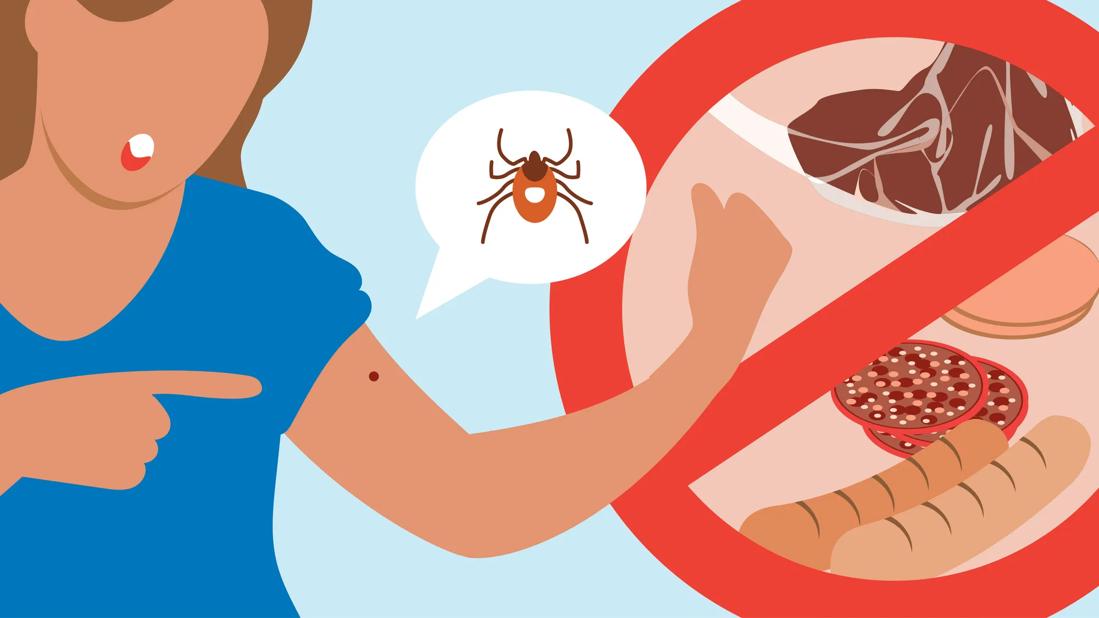Alpha-gal syndrome has become more common and is a leading cause of anaphylaxis

Image content: This image is available to view online.
View image online (https://assets.clevelandclinic.org/transform/c470a795-c233-4832-822a-c21b96d3fe4a/person-tick-bite-red-meat-2156939386)
Person with a tick bite, and variety of red meats crossed out
Bad news, burger fans: A tick bite can permanently remove red meat from your menu.
Advertisement
Cleveland Clinic is a non-profit academic medical center. Advertising on our site helps support our mission. We do not endorse non-Cleveland Clinic products or services. Policy
A meat allergy known as alpha-gal syndrome (AGS) is typically triggered by a tick bite. Case counts are growing, too. There were only 24 reported cases in the United States in 2009. Between 2010 and 2022, researchers documented more than 110,000.
Today, AGS is a leading cause of anaphylaxis, or severe allergic reaction, in certain areas of the country.
“Tick bites are an unusual way to become allergic to a substance,” says allergist Frank Eidelman, MD. “But alpha-gal syndrome is something to be aware of — especially if you’re having unexplained allergic reactions.”
So, what do we know about this emerging allergy that threatens to cool the coals on our favorite backyard grill options? And what can you do to avoid it? Dr. Eidelman has some food for thought.
One little bugger — the lone star tick — appears to be the main source of AGS in the United States. The tick is very aggressive and most active (and biting) from early spring through late fall.
The lone star tick gets its name from the appearance of the adult female, which has a single white dot — or “lone star” — on its back. The tick has long called southeastern states home, but its range has now expanded into the Midwest and Northeast.
Advertisement
But other tick species haven’t been ruled out as potential sources of AGS. The reason? “There are other parts of the world where this phenomenon has been identified, and the lone star tick is not there,” notes Dr. Eidelman.
Ticks feed on blood after they bite, but those parasites don’t just take. They also might leave something behind from their saliva — specifically, a sugar molecule called alpha-gal (α-Gal).
When alpha-gal from a tick enters your bloodstream, your body can suddenly build a sensitivity to red meat (which also contains alpha-gal). Eventually, your immune system may start viewing red meat as a danger when it hits your belly.
What happens next? Well, your immune system goes into attack mode and releases antibodies to combat the perceived threat. This kicks off an allergic reaction.
Like most food allergies, reactions can range from mild to life-threatening and include:
But what’s unusual about AGS reactions is how long it takes for symptoms to appear. Most AGS reactions occur three to six hours after eating. (For comparison, most food allergy reactions take place within minutes.)
“That delay can make it more challenging to make a direct association with what was eaten,” says Dr. Eidelman.
Most tick-driven cases of AGS occur in people who previously had no issues eating red meat.
Talk to a healthcare provider if you show signs of AGS after eating red meat. This includes beef, pork and lamb, as well as meat from other furry, warm-blooded mammals like deer and rabbits. “All of these can cause a reaction,” says Dr. Eidelman.
Other foods connected to AGS reactions include:
AGS isn’t connected to poultry meat (like chicken or turkey) or fish and seafood.
Confirmation of the allergy typically comes through a blood test that looks for antibodies to alpha-galactose. A skin test may also be done.
Some people with AGS will be prescribed an epinephrine auto-injector — more commonly known by the name EpiPen® — for potential use in case of an anaphylactic reaction, says Dr. Eidelman.
Over-the-counter antihistamines can be used to help ease symptoms for less severe reactions.
There isn’t a current cure for AGS.
Given that tick bites are the main cause of AGS, taking proper precautions while outdoors is your best defense against the syndrome, says Dr. Eidelman. He recommends:
Advertisement
Make sure to check your clothing and skin for ticks before coming back inside, too. Remove any attached ticks with tweezers ASAP. (Here’s how to safely remove the burrowed-in bugger from your skin.)
Advertisement

Sign up for our Health Essentials emails for expert guidance on nutrition, fitness, sleep, skin care and more.
Learn more about our editorial process.
Advertisement
Keep ‘mozzies’ at bay by avoiding scented body products, beer and certain colored clothes
Vanilla extract won’t keep mosquitoes away for long, if at all — and could even attract other bugs, like wasps or flies
These red, raised bites often show up in a zigzag pattern on areas of your skin that come into contact with bedding
Twice daily tick checks, the right bug sprays and long pants can help you prevent tick-borne diseases
Bug bites create tiny openings in your skin that can let in dangerous bacteria
Using insect repellent, covering up and keeping your property dry can help keep the buggers at bay
Kissing bugs are insects that can carry a dangerous parasite that causes Chagas disease
Whether you scrape or pull out the stinger, the key is to do it quickly
Although it could be used as a moisturizer, this new trend is not recommended
Communicating clear limits helps protect your time, energy and emotional well-being
High cholesterol can be genetic, but testing and treatment can lower your heart disease risk